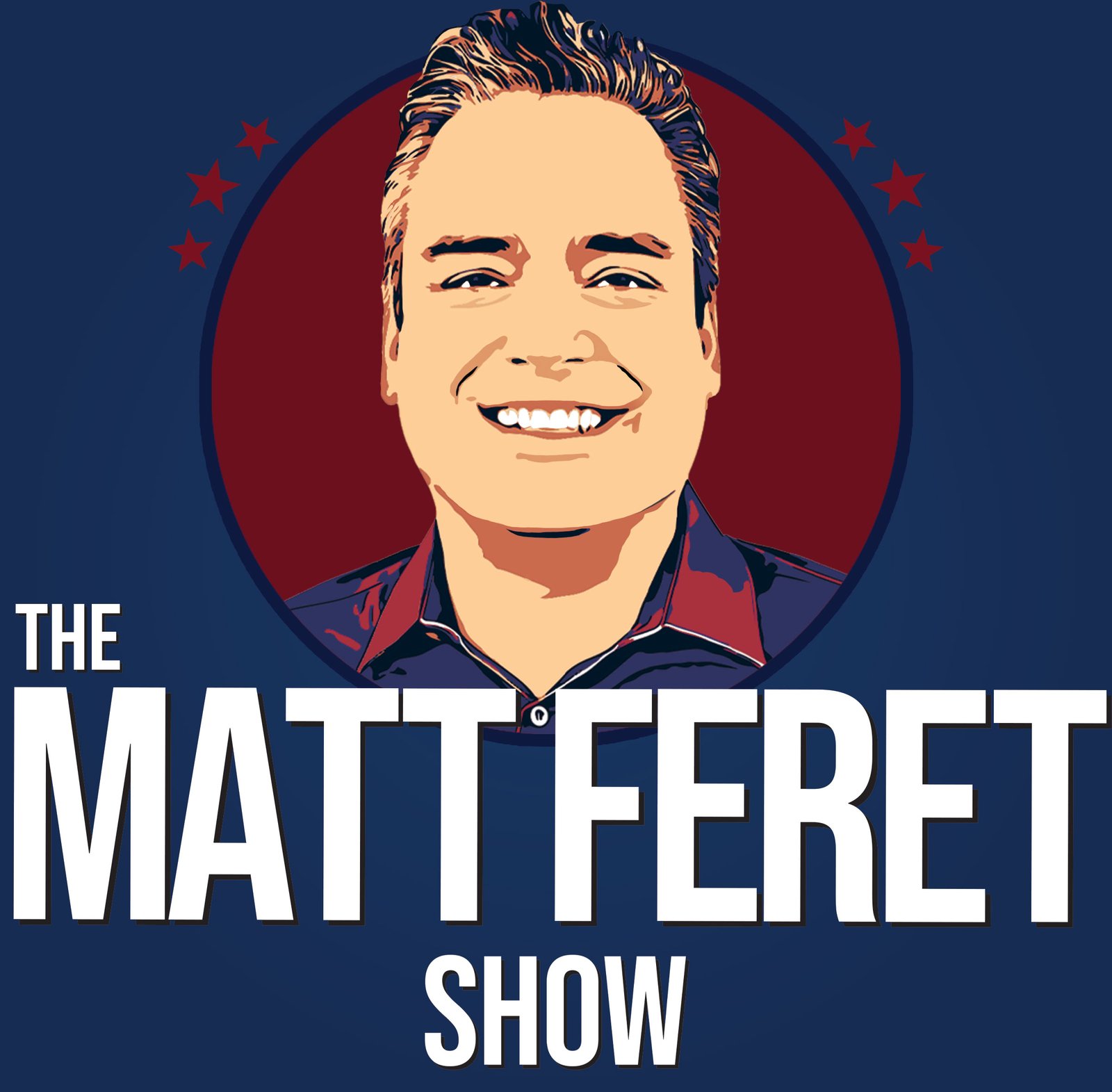#048
Share This:

Welcome to another enlightening episode of The Matt Feret Show. I'm your host, Matt Feret, and today, I'm joined by Braden Pan, the founder and CEO of Resolve. Braden is dedicated to preventing medical bills from bankrupting Americans.
Join us as we discuss the complexities of healthcare costs and explore strategies to reduce medical bills.
Listen to the episode on Apple Podcasts, Spotify, Deezer, Podcast Addict, Stitcher, Google Podcasts, Amazon Music, Alexa Flash Briefing, iHeart, Acast or on your favorite podcast platform. You can watch the interview on YouTube here.
Brought to you by Prepare for Medicare – The Insider’s Guide book series. Sign up for the Prepare for Medicare Newsletter, an exclusive subscription-only newsletter that delivers the inside scoop to help you stay up-to-date with your Medicare insurance coverage, highlight Medicare news you can use, and reminders for important dates throughout the year. When you sign up, you’ll immediately gain access to seven FREE Medicare checklists.
Quotes:
"Each insurance company negotiates its payment structures with the hospital."
"Healthcare is open, especially for emergency care services, leading to little market pressure for competitive pricing."
"People enter healthcare with good intentions, but the complexity and incentives in the system can isolate them from helping patients."
#048
Selected Link from the Episode:
For more from me, Matt Feret, dive into these
- All Things Medicare: prepareformedicare.com
- Decoding Social Security: prepareforsocialsecurity.com
- My Written Works on Amazon: www.amazon.com/stores/Matt-Feret/author/B09FM3L4WW
- The Matt Feret Show's YouTube: www.youtube.com/@themattferetshow
- Official Podcast Website: themattferetshow.com
- Network with me on LinkedIn: www.linkedin.com/company/prepareformedicare
- Catch my tweets on Twitter: twitter.com/feret_matt
- See behind the scenes on Instagram: www.instagram.com/matt_feret/
- Join our community on Facebook: www.facebook.com/themattferetshow/
To learn more about Braden and his work, you can visit the following social links:
- Website: https://www.resolvemedicalbills.com/
- LinkedIn: https://www.linkedin.com/in/bradenpan
- Instagram: https://www.instagram.com/resolvemedicalbills/?hl=en
Full Show Transcript:
Matt Feret: [00:00:00] Hello, everyone. This is Matt Feret, author of Prepare for Medicare and Prepare for Social Security Insiders Guidebooks and Online Course Training Series. Welcome to another episode of the Matt Feret Show, where I interview insiders and experts to help light a path to successful living in midlife, retirement and beyond.
Matt Feret: Braden, welcome to the show.
Braden Pan: Thanks for having me, Matt. Excited
Matt Feret: to be here. Glad you're here. Tell everybody what you do, how long you've been doing it, and how you help people.
Braden Pan: So we lower medical bills for Americans. Think of us like a TurboTax for lowering your medical bill or your medical debt. We've been doing it for about four years now.
Braden Pan: We've helped thousands of people save over 30 million in total on their medical bills. And we're helping people get out of medical debt and move forward with their lives so they don't have to be crushed. by medical bills, but they can actually live their lives.
Matt Feret: That's a very big topic. I'm really happy to get into it.
Matt Feret: When you say you help people lower their medical bills and then get out of debt, let me start, start with the lowering medical bills. [00:01:00] First, give me a story. Tell me a scenario where you guys might jump in.
Braden Pan: Broadly speaking, it's anytime you have a large medical bill, right? But as an example, we had somebody from Tennessee come to us.
Braden Pan: Who was living the American dream. Great job, house in the suburbs, family, two cars, had a kid who was going into high school in a couple of years. They had a lapse in insurance. They ended up with an 80, 000 medical bill while they were uninsured. The hospital was being aggressive in collecting from them and that was threatening their They didn't have 80, 000.
Braden Pan: They could either sell their house or they could cash out the money that they had saved for their kid's college fund to pay this medical bill. And so they came to us not knowing where to turn. And we were able to negotiate that down to under 20, 000 for them. Oh, wow. And there's other examples that we have where we've wiped medical bills entirely off.
Braden Pan: For people as well.
Matt Feret: So in that [00:02:00] particular scenario, they had a lapse in insurance, which I am going to interpret as that the person with the health insurance either resigned or lost their job and didn't elect COBRA or did and it ran out something along
Braden Pan: those lines. Or as confusing in the election of COBRA and the start date didn't, you know, there was a gap in insurance when they started COBRA, which happens very frequently, right?
Braden Pan: Like getting set, getting yourself set up on COBRA can be very confusing.
Matt Feret: Yeah, it absolutely can. It's definitely not straightforward. There's not, there's not one click continue, uh, anywhere. Right. So you help lower medical bills. Let's talk about that, that 80, 000. So somebody didn't have insurance coverage.
Matt Feret: They had to go to the hospital and the hospital sent them a full bill. What is something like that when you don't have insurance? What is that 80, 000 usually represent?
Braden Pan: So from a pricing perspective, that's what's called the charge master rate, which is the full rack rate for going to a hospital. The reality is nobody actually pays that rack rate.
Braden Pan: I'm going to bucket hospital pricing into three broad buckets. You've got [00:03:00] the Medicare rate, which is what the government sets and says, we are going to reimburse you hospital or you doctor's office this amount for this procedure. Medicare runs an analysis and tries to set that as a cost class. So the cost of running that procedure plus some profit margin.
Braden Pan: Or the hospital, but a very small one. Then you have the insurance negotiated rate. That's the rate that the hospital and the insurance company will negotiate behind closed doors for a procedure. Now, A hospital can have different and will have different negotiated in terms negotiated rates with different insurance companies that they work with and the same insurance company will have very different rates for the same procedure at 2 separate hospitals that could be down the street from each other.
Braden Pan: So it can be very confusing. That's also a discount rate and then the 3rd rate is that charge master rate that fully loaded rate. It's an absolutely absurd number. It averages four to five times the actual hospital costs. And we've seen hospitals where the charge master rate is over 20 times their costs.
Matt Feret: Is that kind of the, that, that master rate you said, [00:04:00] is that kind of when you hear stories every once in a while that someone got charged a thousand dollars for an aspirin while they were in the hospital?
Braden Pan: Yep. That's exactly what it is. That's the charge master rate where they just made up an absolutely insane number and then basically inflated it by 10 to 15 percent every year
Matt Feret: since they made it up.
Matt Feret: Okay. So I get what you're saying. Medicare basically dictates if you're on Medicare, they dictate to the hospitals or anybody else. Really there's a payment structure that says this is what we're going to reimburse you. If you want to take Medicare, you gotta accept this number. And of course, no one, very rarely do people not accept Medicare because there's a lot of Medicare patients, right?
Matt Feret: In the next 10 years, one out of five Americans are going to be over the age of 65. So you're going to be cutting out a sizable amount of customers if you don't take Medicare. Same thing with Medicaid, likely, but you know, government slash state funded or run programs. And then commercial insurance, which is the stuff you get at your employers or the ACA, the individual exchange.
Matt Feret: So then there's, there are [00:05:00] negotiated rates there. And if I If I heard you correctly, each insurance company negotiates its own payment structure with each, in this case, hospital,
Braden Pan: right? Roughly speaking. Yes. I mean, it gets a little bit more complicated when you dig into it, but broadly speaking, that's the best
Matt Feret: way to think about it.
Matt Feret: And so if I'm on like insurance through my work, commercial insurance, that's why when I get an explanation of benefits or an EOB, the charge might say 80, 000. And then it says discount rate. 20, 000 and then my benefits kick
Braden Pan: in, right? Correct. Because the insurance company negotiated so that that 80, 000 charge is actually a 20, 000 price for them.
Matt Feret: Okay. So that 20, 000 charge versus the 80, 000 charge is actually kind of an unspoken benefit of having insurance. It's not only the financial protection when you get a bill, But essentially when you're buying insurance on your own, or you're using your employer's insurance, the other [00:06:00] benefit is that that insurance company has negotiated discounted rates so that when you do pay what you owe, it's actually starting at a lower point.
Matt Feret: That's correct. Yes. Okay. Thank you. I thought I got that right. But again, broadly speaking, um, so let's go to the self pay thing or when you have a gap in coverage or when someone is out of network, why on earth are healthcare providers a allowed to put something out that's up to, as you said, 20 X they're quote unquote real rate or even four or five X.
Matt Feret: How does this situation occur?
Braden Pan: Yeah, if you're asking from a regulatory perspective or a market perspective, I can answer from a market perspective, right? And that's basically healthcare costs or healthcare is very, very opaque, right? Like, you can't go to when, especially for emergent care services, where this happens often, you're not shopping around for different emergency rooms to find the one with the best price.
Braden Pan: And even if you are shopping around for something that Right. Not an emergency. You don't [00:07:00] always know exactly what that service you need is. Yes, if you just need surgery on your ACL for an ACL tear, that can work, but maybe you have a pain in your abdomen, you think it's appendicitis, the doctors think, but they don't know exactly what it is, they've got to cut you open.
Braden Pan: To take a look, but it's very difficult to then shop because you don't know exactly what the services are going to end up being and because until recently, hospitals didn't actually have to publish the prices. There is no way to actually shop the store, right? So there were no market pressures to really push our have any type of.
Braden Pan: Right. So I
Matt Feret: get that, right. You can't really shop around when you're searching for an ER, not the best time necessarily to price compare. And of course we don't even get into quality on this cause we're just talking about pricing and bills. So you're right. There are now things that have been published recently that will show a list of prices.
Matt Feret: I think I've read some hospitals or some, some healthcare providers have been reticent or late
Braden Pan: in publishing those. So, The initial penalty [00:08:00] for not publishing that with something like 300 a day, which amounts to about 90, 000 a year, which for some large hospital systems is nearly a rounding error. And so they said it's just not worth it to actually take the time to publish this.
Braden Pan: We'll just pay the fine. You know, that's since changed and the government is working on getting hospitals to publish their pricing, but it's still not a universal thing, despite being required.
Matt Feret: I bet you're not going to be able to answer this question, but maybe you can give perspective. So yeah, here's an almost impossible question to answer.
Matt Feret: Why would a health care provider or a hospital double, triple, quadruple, 10x charge someone? For a bill. I mean, they're a health care provider. I don't expect them to not have a profit. I mean, it is capitalism after a while, but how when you get to that 1000 aspirin or that 80, 000 bill, but really, they expect 20 grand.
Matt Feret: What about our system is broken or jaded enough to, like, think that's
Braden Pan: okay? You know, that's a great question. I don't [00:09:00] have the definitive answer. You're right. I have some speculation on it. I think, well, let's put it this way. Everybody who goes into health care almost universally is going in with the best intentions, right?
Braden Pan: They want to help people in some way, but the health care system is so incredibly complex with so many almost perverse Incentives for doing things that you start to get isolated From the end of actually helping the patient, especially when you're not the doctor, the nurse who's actually sitting there treating the patient, who, by the way, have nothing to do with health care bills.
Braden Pan: They don't set the rates. They don't know what the rates are. They're not making any determination on the rates. Instead, you've got the accounting office and the billing department in the back who has no contact with the patient actually making these decisions and setting these rates. And I think because things are so far removed and because you've got all these other incentives going on, you start to.
Braden Pan: You get a scenario where this starts to happen, then it compiles over time.
Matt Feret: Again, I'm asking you to speculate if you don't know. So, [00:10:00] fair warning, right? This is the second question you probably can't answer, but maybe you can, and that's why I'm going to ask it. So, when I think about, if I'm a hospital administrator, I'm not picking on hospitals, it's just easy to say a hospital administrator, because everybody can see the hospital building in their mind.
Matt Feret: So they have, let's say a panel of patients, right? They've got people that live within a 10 square mile and let's call it a hundred thousand people out of that a hundred thousand people. They're going to have a certain percentage that are Medicare and Medicaid, where they've got set reimbursement basically.
Matt Feret: And then they've got commercial slash individual affordable care act people. And that's a percentage. And then they have a percentage of people, like your example, that are uninsured for whatever reason. Choice, circumstance, uh, clerical error, misstep, mistake, whatever. What percentage of, again, speculation, do they charge these prices to somehow balance their books?
Matt Feret: In other words, the Medicare rate is kind of coupler percentage points profit. The commercial rate's typically [00:11:00] a lot higher. But somehow they've got to balance their books by self pay people. Is, is that a reason?
Braden Pan: I don't think it is, largely because hospitals really struggle to collect from self pay people as it is.
Braden Pan: They collect anywhere from 25 to 35 cents on the dollar charge to self pay people anyway. They just end up sending them to collections. It actually costs them five times as much from a self pay patient as it does from insurance, because they spent so much time and effort collecting, then they send them to collections.
Braden Pan: And if they take any type of aggressive collections activity, they do run the risk of negative PR and regulatory action, right? Like every now and then you hear or you see news articles about hospital systems that have been suing patients on a regular basis to recover monies. And that's never a good, good look for a hospital.
Braden Pan: So I actually don't think they do it as an attempt to balance their books or collect more. There might be some level of accounting shenanigans that go in. To this and the reasons why they have these high prices, but I don't think it's from [00:12:00] a, uh, cash collection.
Matt Feret: Thank you. So I'm going to wrap up the uninsured first, but I definitely want to go to the insured because just because you have insurance doesn't mean that you're, you're, I think all of us know, I'm not going to have issues with, with billing and trying to match paper up.
Matt Feret: So for the uninsured folks that find themselves in a situation where they have to self pay, is there a threshold of debt or bill? that you kind of deal with, or is it very on the end of it by the individual, the circumstance?
Braden Pan: So for us, we only work on bills 1, 000 or more because we need to find enough savings to charge enough money to cover our costs.
Braden Pan: And we charge a percent of savings found between 10 and 25%. So we want to find a large chunk of savings. Now we're working. I'm doing a better job of cost efficiency so we can take that thousand dollars and drop it down. And it was 5, 000 two months ago. So we've been successful in dropping the minimum [00:13:00] size
Matt Feret: down.
Matt Feret: I mean, I think a thousand dollars is low enough. I mean, that's, I was, I was expecting you to say 10 because you're right. I mean, you guys got to eat, right? If you're providing a service, you've got to have some sort of margin there. It's a very generous amount. A thousand dollars. Yep. Let's go to people who have insurance, and I don't know how you want to tackle it, but in my world, right, the Medicare world, I know that two types of medical, actually three types of medical insurance policies, uh, or three ways to consume Medicare.
Matt Feret: So, the first way is just to use original Medicare A and B, and there, that's basically an 80 20 plan, right? The feds pay 80, you end up being on the hook for, for 20. And one of the things that people don't really realize about that is that it, that 20 percent is essentially uncapped. You can pay 20 percent of 5 million because there is no maximum out of pocket.
Matt Feret: There's never a time where original Medicare says. You're good. You don't have to pay anymore. In fact, there are lifetime limits if you really hit them. If you're in the hospital for a very long time, there's a chance you can hit your [00:14:00] lifetime limits. So you might have insurance, but if you have a really bad event, there could be some massive bills that are valid by the way, right?
Matt Feret: That are valid that you could have. The second way of doing it is to add a Medicare supplement policy, which basically picks up most or if not almost all of that 20%. So now you have. Medicare paperwork coming in who they send it to the Medicare where the billing office sends it to the Medicare supplement insurance company, they generate it and then they send you and you're trying to match paper, right?
Matt Feret: What did the feds pay? What did my supplement company pay? Why is there a delta? And then there's Medicare advantage, which is kind of a fully insured product. And you have usually set copays, but you also have coinsurance there as well. The kick there is you have in and out of network benefits. It's So even though 90, what is it?
Matt Feret: 97 percent plus of all doctors except Medicare, that is not the case with Medicare Advantage. There are two different things. Medicare Advantage has Insurance company [00:15:00] networks just like your old commercial plan when you worked So even though you might go to a doctor in Poughkeepsie that accepts medicare They may not accept the medicare advantage plan.
Matt Feret: So now you're out of network, even though they accept medicare. So Let's start with original medicare first the 80 20 piece. What do you see there? Yeah,
Braden Pan: so i'll point out that around 20 of the patients we work with are medicare Age. So we do work with a significant number of Medicare patients, right? And you're absolutely correct.
Braden Pan: We've actually worked with patients who have had such bad hospital events that they've capped their Medicare lifetime limits and then ended up with these enormous bills. And so we can work with the hospital to get a reduction there. Quite frankly, when those bills are that big, there's just no way for the patient.
Braden Pan: To pay it. And once you bring that to the right person at the hospital and present it in the right way, they come to realize that and they're willing to work with you to actually get to a reasonable amount to pay, right? Because most people. They don't have 500, [00:16:00] 000 to pay off, but they're just going to be in debt for the rest of their lives.
Braden Pan: That serves nobody well. And so we're able to actually cut that down.
Matt Feret: And when someone has a Medicare supplement policy that kind of bumps in there, right, that whole paper match thing, should I be paying attention to that as a consumer? Should I just, Oh yeah. Should I just think that the Medicare supplement is picking everything up and I can throw everything in the recycling?
I
Braden Pan: would not assume that. We do a lot of work on actually matching that and sometimes it feels like you almost need a PhD in how Medicare and Medicare Advantage works to actually make sure that that stuff is matched. Luckily, we have people who do this all day long and so they're very, very good at doing it.
Braden Pan: But yeah, you should be looking at all of that to make sure everything lines up. You basically need spreadsheets and tracking system and Enormous amount of organized paperwork to make sure everything is correct. Medicare supplements picking up what they should they're not improperly denying coverage But you have to appeal it if they are
Matt Feret: right and then let's go to medicare advantage That's a whole other ball of wax, isn't it?
Braden Pan: Yes on top of that [00:17:00] is medicare advantage making sure that they're paying everything That they should pay as well. And I'm going to pause that. I apologize. I thought you were talking about Medicare Advantage previously. So,
Matt Feret: Oh, no, it, it, it worked. No, it worked. I think you did. Yeah, no, no, you did. It worked.
Matt Feret: You didn't say anything that was messed up on the Medicare supplement piece. Okay.
Braden Pan: You just threw, threw me for a loop. A little bit. I'm
sorry,
Matt Feret: man. So yeah, I was going original medicare original medicare plus supplement and then medicare
Braden Pan: advantage. Yeah. So you're adding a third layer on basically that now you have to manage as well.
Braden Pan: And that just creates more complexity in the system. And so you just have to track that extremely closely. It's something that you can do if you At the time in the inclination to do it, but most people have lives to live and haven't lived their world in Medicare. And so don't inherently understand it the way you might, that some other people might.
Matt Feret: Do you get involved at all with, let's just say, let's, we're on the topic of Medicare Advantage now, right? Kind of that, that, that third way where the insurance company [00:18:00] denies a portion of a claim and then, then the hospital figures out and then you've got to go back to the insurance company and go, what the heck?
Matt Feret: How do I handle that? I mean, as a consumer, before I call you, how do I
Braden Pan: handle that? Yeah, so I would say if you're going to do this yourself, I think you need to follow three broad steps. One is gather all the relevant information, right? Disable the paperwork, get your explanation of benefits, understand why the claim was denied, get the bills from the insurance company.
Braden Pan: It's likely you're going to want your electronic medical records and your medical records as well, so that you can actually build up a case for why something should be covered. The second is to set the plan for how to go about doing this. In this case, it's, it's relatively clear. We want to appeal coverage.
Braden Pan: And so we're going to set that plan. We're going to build out our appeal, and then we go out and execute on that. And so we run through the appeal process with the Medicare Advantage insurance company. When you're doing this, what you really want to do is try to find an advocate in the insurance company, somebody who will help you along this way, right?
Braden Pan: Like all insurance companies, and I'm sorry, Matt, I know that you've worked in insurance. [00:19:00] They're pretty byzantinian, and when you're on the outside looking in, it can be extremely confusing to figure out the process and how to go through this, right? And so if you have an insider who can help guide you through that process, it makes worlds of difference.
Matt Feret: Okay. So run me through a scenario if you can, or an example that you've got. So I'm on Medicare, and then we can go to commercial after this, because I really do want to hear there because the deductibles and out of pockets are A lot of times way higher on that side than they are in Medicare, but sticking with Medicare for a second, let's say, you know, your policy pretty well, you know, that hospital a is in network.
Matt Feret: You've got to go have surgery on your ankle. You know, your doctors are in network. And so your doctors are in network. You can't really check whether or not you don't have any idea who's going to show up from anesthesia. You don't really know what nurse is going to show up or if they're a visiting nurse or they're from some other facility.
Matt Feret: You don't know, right? All you know is you went to go get your. Your thing fixed. They said, here it is. Oh, you check the facilities and network. In other words, you've done [00:20:00] everything right. And then you have the surgery, you know, you go to P. T. You come home and all of a sudden you're getting medical bills and E.
Matt Feret: O. B. S. And all of a sudden you owe what? It looks like full price from the hospital in my insurance company. Something something two days earlier that said it was paid. But then there's a piece in there that says my anesthesiologist was out of network. I guess they'll catch up to each other. When do I take action?
Matt Feret: Like all of a sudden this, this, this mountain of paperwork shows up and usually I'm just crossing my fingers and praying that, ah, they'll figure it out. At what point do hospitals or facilities usually end up kind of getting that all reconciled and then send you a quote unquote final bill.
Braden Pan: I don't think there's a standard point when that happens.
Braden Pan: It can take months and months. We've seen it take hospitals six, nine plus months to get that all reconciled. There are times when it can't be reconciled for one reason or another, and we've had to step in and actually force that reconciliation. There are also times where hospitals are on top of it, and it takes under [00:21:00] 30 days for everything to be reconciled.
Braden Pan: My recommendation to you when you start getting that is actually start calling your hospital call Uh your insurance company explain the situation and make sure that it's being worked on Rather than sit there and cross your fingers, right? Because if it doesn't get fixed and that's actually a bill That the hospital thinks you owe if it becomes overdue for long enough You can get sent the collection which isn't the end of the world It's not going to hit your credit report for a significant amount of time after collections and you still have time to fix it But it's also not an experience that You want to have
Matt Feret: no, it's not.
Matt Feret: And I'll just give you a personal. I mean, this, I can't tell you, it's probably happened to you because it's probably happened to everybody listening or watching right now, which is I went and had something done and immediately the insurance company tries to give me a bill. I'm like, again, I've been in insurance, but it doesn't take a rocket scientist to know like you guys didn't even send the billion yet and you're sending me a cash bill.
Matt Feret: I don't pay it and I'd pay my bills on time. Just like probably everybody else tries to do or does. Um, I don't pay it. Yeah. [00:22:00] Um, and then, you know, I've gotten where 30 days later they'll send a we're going to send you to collections evil letter and I'm like, Whoa, wait a minute. This is 500 bucks. I'm good for 500 bucks.
Matt Feret: I knew I was going to get healthcare services. I knew I was gonna have out of pocket, but I don't know that I owe you that. And so then I have to go through this whole E. O. B. Thing of logging in. Um, it's, it's annoying. And if I had a fragile ego, I would say it's offensive. So 500 bucks or 5, 000 bucks. What should I think about the collections process and aggressive billing and how to handle that?
Matt Feret: Well, so
Braden Pan: one thing to remember with collections is just because something goes to collections doesn't mean it's going to hit your credit report. In fact, there's a regulations that limit what can and can't go against your credit report. So if something goes to collections, first of all, the collections company has to report this to a credit reporting agency.
Braden Pan: Before anything can happen. And so if they're not reporting it to a credit reporting agency, nothing will go on your second. It's [00:23:00] got to, the bill has to be over 500 for it to have any effect. On your credit report. And third, even after a collections agency reports something to credit Bureau, there's a 12 month curing period where you have 12 months to solve the issue before it actually shows up on your credit report.
Braden Pan: And if it ever does show up on your credit report, and then you get it solved, it gets wiped from your credit report completely. Right? So you still have protection, right? Like, yes, getting. Calls from collections agencies is never fun, but that doesn't mean your credit is going to be destroyed Just because you start getting these calls you still have time to figure things
Matt Feret: out Yeah, I guess it feels offensive to me because I don't get sent to collections Like it feels like they're pulling the trigger on this stuff pretty quick
Braden Pan: pretty quickly And so there are things I guess I should back up and say there are things you can do with the hospital as well When they start sending them, this is why I say If you start getting a bill from a hospital, reach out to the hospital and the insurance company, try to get the process along solving it, right?
Braden Pan: Because if you do get that threat letter, you can call the hospital, ask them about it, talk to them, see if they're actually working [00:24:00] with the insurance company, ask them to put it, uh, the bill on hold to stop it from going to collections immediately while you work through the process to try to get the insurance company to pay more.
Matt Feret: I've been in the situation as well, and I know I'm making it personal, but I'm sure everyone or many, many people in this where I've gotten a bill and I paid it. And then six months later, I get a check from the facility or the doctor that pays me a percentage back. And then I go, man, that's annoying.
Matt Feret: You've held onto my money for six months. I could have kept it in my bank account. Is there a timeframe that you suggest kind of holding on that? You mean
Braden Pan: I'm paying a
Matt Feret: bill? It's like they're sending you a bill before the insurance has paid them. It's almost like, wait, you're getting paid. And they're like, yeah, we don't care.
Matt Feret: We want your money and then we'll get reimbursed. And then when we get around to it, we'll send it back.
Braden Pan: Yeah. So that's a really good question, right? Like I would say hold off for 30 to 60 days, right? You want to give time for the insurance company to run through the process or everything now may not actually happen in 60 [00:25:00] days.
Braden Pan: There are times when things can take longer than that, but as you hold off longer and longer, you start to run the risk of going overdue. With your doctor's office or with your hospital, if you really want to avoid going to collections, you do want to end up paying that if you can. So let's
Matt Feret: go to commercial insurance.
Matt Feret: And I, and I make the difference again, because when you have Medicare insurance, you typically have, I don't know, more comprehensive coverage than some of the commercial plans out there. I mean, there are employer based plans with 10, 000 individual deductibles and 20, 000. I mean, just bare bones stuff.
Matt Feret: Even in big companies, right? Uh, you've got HSAs, which are, you know, ways to, I guess, save your own money to pay your deductibles, but those deductibles have to be really high. And I don't remember what they are this year, but, you know, in the past, let's call it 5, 000 individual deductible, 15, 000 annual deductible.
Matt Feret: We're talking about a lot of exposure, even though you have quote [00:26:00] unquote You know, comprehensive insurance. What are the nuances there, even if you're insured and getting billed? What are the nuances on, on commercial insurance if we're still working or getting insurance from an employer?
Braden Pan: Yeah. So we see three broad cases for people who have large bills, even though they have commercial insurance.
Braden Pan: The first is what you're, you're talking about. They have a really high deductible as much as 20, 000, uh, for the family. Uh out of pocket max for the year and they start to get up towards that max and they can't afford to pay The second is they go out of network for a surgery And then they have an out of network bill insurance company either doesn't cover it or only covers a small portion And the third is they are in network, but the insurance benefits doesn't cover whatever They whatever surgery or whatever procedure they had and so they end up with a large bill from the hospital So all three of those are Things that we can work, right?
Braden Pan: So if you have a large deductible, we can negotiate with the hospital, or you can negotiate with the [00:27:00] hospital to get that to get that down, right? Hospitals often recognize that people can't pay 20, 000 out of pocket. They're not going to collect 20, 000 on average from people. And so they're willing to work with you as long as you can make good faith efforts to pay.
Braden Pan: If you're getting denied coverage because you're out of network or it's for services not provided for another reason, you can go back to your insurance company and run an appeals process to get more coverage for that so that you can get your bill. Okay. And you can help with all of that. We can help with all that.
Braden Pan: We do that all the time.
Matt Feret: So if I wanted to do this myself, yep. And let's, let's pretend I, again, I went to have surgery and my deductible is 10, 000 bucks and I knew it. And I don't have 10 grand to pay a hospital, but I can't walk. So I get a bill for 10 grand, my deductible insurance is processed properly.
Matt Feret: I knew it was going to happen. I can't cut a 10, 000 check. What should my approach or what could my
Braden Pan: approach be? In that scenario, I'm going to offer to two [00:28:00] options, but I do want to point out that we do have a full guide on our website available for free to anyone who wants it. They can walk through all of this in much, much more detail.
Braden Pan: Now, we don't cover every single thing that could happen, right? Because this isn't so incredibly complex. So we've got 40 pages of how to understand this, how to build your plan and how to go out and execute on that. But in your scenario that you're proposing, I'd suggest first actually taking a look at the financial aid policy of the hospital to see if you can qualify for financial aid.
Braden Pan: Most hospitals have it. Financial aid policies. And so if you're below a certain multiple of the federal poverty line, in some instances, that's four times the federal poverty line, which is four X, the federal poverty line for a family of four is over 100, 000. So if your income is below that, you can qualify for some either a full wipe or a discount.
Braden Pan: If you don't qualify for the hospital financial aid department, that's when you can go and start negotiating on their bill. Generally speaking, the most compelling offer to a hospital is some sort of lump sum. Right. So instead of 10, 000, you've got 5, 000. You'll offer that right [00:29:00] now in exchange for the bill to be considered in full.
Matt Feret: I don't say this to, in any way to mean what you do or the industry, but. I've heard of these approaches before one other place in America only. And that is with like high balance credit card debt. Are there parallels? Cause I'm kind of feeling like there might be. So
Braden Pan: there are some parallels. I think the difference is for high balance credit card debt in order for you to pay that off, you have to stop making payments on your credit card debt and start making payments to the debt negotiator, the credit card debt negotiator.
Braden Pan: And that starts to destroy. Your credit or your credit. My industry. So both my company and everyone else in the industry does everything they can to protect people's credit. We don't want people's credit going down down the drain during the negotiation process. We just want to allow people to be able to pay some amount to get out of debt so that they can move forward their lives.
Braden Pan: It's kind of ridiculous that you had. Surgery, you can barely walk and now you have a [00:30:00] 10, 000 bill that you're dealing with on top of trying to get your life back, trying to recover, trying to probably get back to work, working or spending time with your family.
Matt Feret: Right. Any particular situations and other forms of insurance like a worker's comp that factors into this or, uh, anything?
Matt Feret: Oh, how about those? I'm going to, I'm not going to get the, the phrase correct. Some of these religious based. Meta,
Braden Pan: yeah. Meta share type plans or limited benefit plans. Yep. So we see those all the time. I'd be very wary of using insurance there because they can essentially deny coverage for whatever reason they want.
Braden Pan: Um, and because they're not ACA compliant, you don't have the same type of state and federal regulatory bodies that you can appeal to if they're not covering appropriately. And so we see people all the time who have these types of Plans who are denied coverage and they're getting these enormous bills that we have to work through.
Matt Feret: Yeah, so I'm not going to get, again, I'm not going to get this right, and everybody can listen to it and Google it if you want, but it's basically when ACA [00:31:00] was passed, right, the individual health insurance bill, they said, hey, insurance companies, real insurance companies, here are kind of the parameters within which you must operate.
Matt Feret: And then there was a kind of a carve out that said, if you're a religious organization or religious fraternal organization, you can offer essentially an insurance like product based on donations. And it's really appealing because those ACA plans are not cheap and there's always something out there on the internet or you hear from a neighbor or even your church that says, Hey, have you checked out this kind of face faith based things?
Matt Feret: But it's not, again, as I understand it, it's not true insurance, right? They don't have the federal state regulations and oversight to a have enough money or reserves in the bank to pay the, you know, the potential outstanding bills. You said you see a lot of confusion around those faith based insurance, pseudo insurance products.
Matt Feret: That
Braden Pan: and what I'll call our limited benefit or fixed price indemnity. Plans which aren't faith based, [00:32:00] but they're also pseudo insurance plans where they they basically do the opposite of insurance. They'll pay you a certain amount and they cap that right. And so we see all the time. People have fixed price are fixed benefit plans where that's capped at 2500 a day in payments to the hospital.
Braden Pan: So if somebody goes to the hospital has surgery is in recovery for 5 or 6 days. I can tell you right now that no hospital only charges you 2, 500 a day for a hospital stay. It's many multiples of that. And so they end up with these enormous medical bills as
Matt Feret: well. Yeah. Obviously I have my own opinions given my insurance background, but uh, I think real insurance is important, is always, is important, uh, even if it's more expensive because I would,
Braden Pan: I would 100 percent agree with you given what we see all the time with people that we
Matt Feret: work with in health.
Matt Feret: We've gone through a lot of different very specific scenarios that will touch just about everybody listening to this I mean, I've already asked at what level you said a thousand bucks When do I know I need help is that the stack of paperwork on my desk that I'm supposed to [00:33:00] review and I don't know If it's processed correctly, is it when I get a big old bill and I can't pay it Maybe I can pay it, but I want somebody to check it.
Matt Feret: You know, this is not something I think what you do is not In, I guess the population's brain, it's kind of a, I got to self serve this and figure it out. I know that when I go get something done, I'm going to get a mountain of paperwork and bills and then revised bills. And nobody wants to sit there and call the doctor, the hospital and get passed around.
Matt Feret: And we're the insurance company. It's a. Big pain. Is part of what you do alleviating that pain and basically hiring an expert to
Braden Pan: do it? Massive part of what we do is alleviating that pain. So that time, we save people on average 40 hours of time actually trying to work through all this stuff and deal with all this stuff.
Braden Pan: An enormous amount of stress. And sort of that comfort in knowing that they have people who are whose job it is to figure all this about, uh, doing this and getting them the best deal possible. That being said, the other question you asked and sort of when do I [00:34:00] know when I should go call an expert to do this?
Braden Pan: I think that is a little bit individual. There are some people who are sort of. Want to take care of things more on themselves or sort of more willing to dive in and work through this and others. I think when you start questioning, should I be talking to somebody else? Should I be finding somebody to help me out?
Braden Pan: I think that's the best time to actually throw that question and go out. And try to find somebody come to resolve or find another medical billing entity to help take care of this for you.
Matt Feret: I'm glad you're doing this. I know it was out there, but it's because I'm in this space, but I got to imagine it's not something I mean, the amount of relief you must when someone finds you, the amount of relief you must get over the phone has to be has to be very rewarding and just from a personal and professional standpoint.
Braden Pan: It is. I will say the team of people that we have who talk to patients initially over the phone, that's sort of what feeds them is when they can actually help people move forward. You've got people who are basically feel crushed and sitting in a corner, right? Because if you've got these enormous medical bills, it's [00:35:00] threatening to turn their entire life upside down on top of the fact that they're probably recovering from some sort of major medical event because that's what drove those medical bills in the first place.
Braden Pan: And so we're able to find a path out for them so that they can move on with their lives. Get this all solved, put this behind them and move forward.
Matt Feret: So if I'm doing this myself, or I've got a family member, or you know what, if I'm a caregiver, right, if I'm somebody who's already spending gobs of my own personal time helping a loved one, I can take my pile of paperwork and go, here you go.
Matt Feret: You can. And you'll give me the thumbs up?
Braden Pan: We'll, we'll take a look. We'll give you the thumbs up. We'll tell you, uh, we can find you savings and we'll go out. And actually get those savings for you. Yes. It
Matt Feret: sounds so
Braden Pan: wonderful. It is. It's very easy. It's very easy. It's just, and we've designed it to be as big a load off your back as, as possible.
Braden Pan: Wow.
Matt Feret: Wow. Before we wrap up, give me another story. I want to hear, uh, [00:36:00] of the success story. Someone called you, they were drowning in paperwork or they, you know, didn't have a, do you have like just a super cool story of a, of a, of a wonderful outcome?
Braden Pan: Here's one that's, that's really memorable. We had a, we had a veteran who had a million of medical bills.
Braden Pan: There was an issue with The medical provider charging the veteran the va covering some of it, but not all of it And what ended up was this veteran who was on a pension had a million dollars worth of medical bills And so we were oh my god able to work through that process I mean it took us a lot of time to organize everything because this person was absolutely crushed They actually had their health was declining and they were convinced it was because these medical bills Were happening was causing their health to decline.
Braden Pan: We got the the million dollars to drop down to I think it was under fourteen thousand dollars At the end of the day for them and then got them on a payment plan so that they're able to pay it off and then move forward with
Matt Feret: their life a [00:37:00] million to 14, 000 a right, not a political statement, but just a man that just ain't right now.
Matt Feret: I mean, that's how that even happens. That someone's got a million bucks and has to call you for help is just crazy. That's my, that's my editorial aside, but it's also a really great story of when you think you're lost, you think you're confused, you've got paperwork piling up, bills coming in, calls coming in, there's help.
Matt Feret: And I'm really happy that you took time to. Explain to people and me when and how and how this all works. So, um, geez, I can outsource my pain. It sounds
Braden Pan: great. You can't and save money in the process. I love
Matt Feret: it. Yeah, brain. What question or questions did I not ask about this during a conversation that I should
Braden Pan: have?
Braden Pan: I don't know if there's any questions that you should have asked, but I do want to point out just how big of a problem this is and that if you are dealing with this problem, you're not alone, right? Something like 4 in 10 [00:38:00] Americans, that's over 100 million people, deal with medical debt, and there are communities in the U.
Braden Pan: S. where it's over 25 percent of the population has medical debt that they're dealing with, and that's an enormous issue. Not just financial, but health toll, right? Like financial toll, dealing with that, or having to put that on your credit card, or deciding between rent and paying your medical debt, um, but health wise, right?
Braden Pan: As many as 40 percent of adults say that they've delayed or gone without needed medical treatment due to costs and the fear of costs. As many as 25 percent of adults have If medications they were prescribed due to costs, right? So like if you are dealing with this, you're not alone in the sense that it's happening way more than it should.
Braden Pan: And in the sense that there's somebody or there are companies that can help you out and get you out of this process. So
Matt Feret: you touched on it once before, but I'm going to make you actually be a little bit more explicit. I can go on your website and I don't have to talk to anybody yet, right? But I can go on your website and do what?
Braden Pan: So two things. One, you can [00:39:00] go on our website. Take a look at all of our resources to understand what's going on and actually solve this yourself if that's the way, if that's the kind of person you are and you want to tackle this and you want to deal with it and you feel like you can get a great outcome.
Braden Pan: The other thing is you can sign up for Resolve, have a quick analysis done of your medical bills to understand what we can do for you. You can talk to a live person on the website or you can just go through entirely in product, not have to talk to anybody and get us started if that's the way you want to do.
Matt Feret: Oh, so I don't even have to talk to anybody if I don't want to, I can just type my little problem, upload some documents, and wait for you to get in touch with me. And off
Braden Pan: we go, or if you really want to talk, you can type your problems in, give us a little bit of background, we'll set up a free console, and you'll get 20 minutes with an expert to go over everything.
Matt Feret: This is awesome. I'm glad, uh, I'm glad I know this is out there. I, you know, you kind of heard of it, but to actually talk to somebody who's doing it, uh, this is awesome. Brayden, thanks so much for being on the show. Yeah, thank you very much
Braden Pan: for having me, Matt, this was great.[00:40:00]
Matt Feret: The Matt Farah Show, related content, publications, and MF Media LLC is in no way associated, endorsed, or authorized by any governmental agency, including the Social Security Administration, the Department of Health and Human Services, or the Centers for Medicare and Medicaid Services. The Matt Farah Show is in no way associated with, authorized, approved, endorsed, nor in any way affiliated with any company, trademark names, or other marks mentioned or referenced in or on the Matt Farah Show.
Matt Feret: Any such mention is for purpose of reference only. Any advice, generalized statistics, or opinions expressed are strictly those of the host and guests of The Matt Feret Show. Although every effort has been made to ensure the contents of The Matt Feret Show and related content are correct and complete, laws and regulations change quickly and often.
Matt Feret: The ideas and opinions expressed on The Matt Feret Show aren't meant to replace the sage advice of healthcare, insurance, financial planning, accounting, or legal professionals. [00:41:00] You are responsible for your financial decisions. It is your sole responsibility to independently evaluate the accuracy, correctness, or completeness of the content, services, and products of, and associated with, The Matt Feret Show, MF Media, LLC, and any related content or publications.
Matt Feret: The thoughts and opinions expressed on The Matt Feret Show are those of the host and The Matt Feret Show guests only. And are not the thoughts and opinions of any current or former employer of the host or guests of The Matt Feret Show, nor is The Matt Feret Show made by, on behalf of, or endorsed or approved by any current or former employer of the host or guests of The Matt Feret Show.














